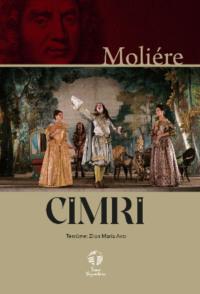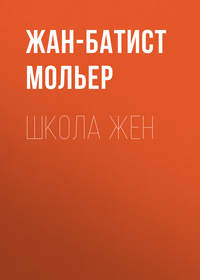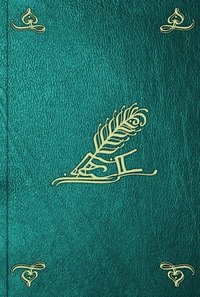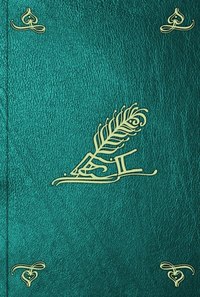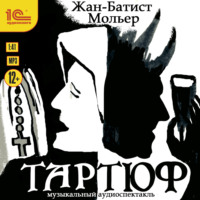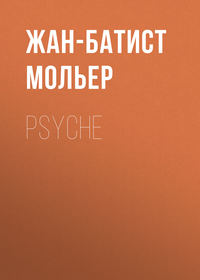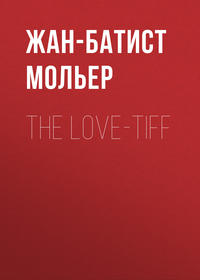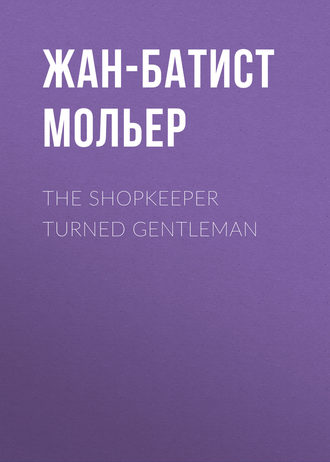 полная версия
полная версияThe Shopkeeper Turned Gentleman
PROF. PHIL. This is a praiseworthy feeling. Nam sine doctrina vita est quasi mortis imago. You understand this, and you have no doubt a knowledge of Latin?
MR. JOUR. Yes; but act as if I had none. Explain to me the meaning of it.
PROF. PHIL. The meaning of it is, that, without science, life is an image of death.
MR. JOUR. That Latin is quite right.
PROF. PHIL. Have you any principles, any rudiments of science?
MR. JOUR. Oh yes; I can read and write.
PROF. PHIL. With what would you like to begin? Shall I teach you logic?
MR. JOUR. And what may this logic be?
PROF. PHIL. It is that which teaches us the three operations of the mind.
MR. JOUR. What are they, these three operations of the mind?
PROF. PHIL. The first, the second, and the third. The first is to conceive well by means of universals; the second, to judge well by means of categories; and the third, to draw a conclusion aright by means of the figures Barbara, Celarent, Darii, Ferio, Baralipton, &c.
MR. JOUR. Pooh! what repulsive words. This logic does not by any means suit me. Teach me something more enlivening.
PROF. PHIL. Will you learn moral philosophy?
MR. JOUR. Moral philosophy?
PROF. PHIL. Yes.
MR. JOUR. What does it say, this moral philosophy?
PROF. PHIL. It treats of happiness, teaches men to moderate their passions, and…
MR. JOUR. No, none of that. I am devilishly hot-tempered, and, morality or no morality, I like to give full vent to my anger whenever I have a mind to it.
PROF. PHIL. Would you like to learn physics?
MR. JOUR. And what have physics to say for themselves?
PROF. PHIL. Physics are that science which explains the principles of natural things and the properties of bodies, which discourses of the nature of the elements, of metals, minerals, stones, plants, and animals; which teaches us the cause of all the meteors, the rainbow, the ignis fatuus, comets, lightning, thunder, thunderbolts, rain, snow, hail, wind, and whirlwinds.
MR. JOUR. There is too much hullaballoo in all that; too much riot and rumpus.
PROF. PHIL. What would you have me teach you then?
MR. JOUR. Teach me spelling.
PROF. PHIL. Very good.
MR. JOUR. Afterwards you will teach me the almanac, so that I may know when there is a moon, and when there isn't one.
PROF. PHIL. Be it so. In order to give a right interpretation to your thought, and to treat this matter philosophically, we must begin, according to the order of things, with an exact knowledge of the nature of the letters, and the different way in which each is pronounced. And on this head I have to tell you that letters are divided into vowels, so called because they express the voice, and into consonants, so called because they are sounded with the vowels, and only mark the different articulations of the voice. There are five vowels or voices, a, e, i, o, u. [Footnote: It is scarcely necessary to say that this description, such as it is, only applies to the French vowels as they are pronounced in pâte, thé, ici, côté, du respectively.]
MR. JOUR. I understand all that.
PROF. PHIL. The vowel a is formed by opening the mouth very wide; a.
MR. JOUR. A, a; yes.
PROF. PHIL. The vowel e is formed by drawing the lower jaw a little nearer to the upper; a, e.
MR. JOUR. A, e; a, e; to be sure. Ah! how beautiful that is!
PROF. PHIL. And the vowel i by bringing the jaws still closer to one another, and stretching the two corners of the mouth towards the ears; a, e, i.
MR. JOUR. A, e, i, i, i, i. Quite true. Long live science!
PROF. PHIL. The vowel o is formed by opening the jaws, and drawing in the lips at the two corners, the upper and the lower; o.
MR. JOUR. O, o. Nothing can be more correct; a, e, i, o, i, o. It is admirable! I, o, i, o.
PROF. PHIL. The opening of the mouth exactly makes a little circle, which resembles an o.
MR. JOUR. O, o, o. You are right. O! Ah! what a fine thing it is to know something!
PROF. PHIL. The vowel u is formed by bringing the teeth near each other without entirely joining them, and thrusting out both the lips whilst also bringing them near together without quite joining them; u.
MR. JOUR. U, u. There is nothing more true; u.
PROF. PHIL. Your two lips lengthen as if you were pouting; so that, if you wish to make a grimace at anybody, and to laugh at him, you have only to u him.
MR. JOUR. U, u. It's true. Oh! that I had studied when I was younger, so as to know all this.
PROF. PHIL. To-morrow we will speak of the other letters, which are the consonants.
MR. JOUR. Is there anything as curious in them as in these?
PROF. PHIL. Certainly. For instance, the consonant d is pronounced by striking the tip of the tongue above the upper teeth; da.
MR. JOUR. Da, da. [Footnote: Untranslatable. Dada equals "cock-horse" in nursery language] Yes. Ah! what beautiful things, what beautiful things!
PROF. PHIL. The f, by pressing the upper teeth upon the lower lip; fa.
MR. JOUR. Fa, fa. 'Tis the truth. Ah! my father and my mother, how angry I feel with you!
PROF. PHIL. And the r, by carrying the tip of the tongue up to the roof of the palate, so that, being grazed by the air which comes out with force, it yields to it, and, returning to the same place, causes a sort of tremour; r, ra.
MR. JOUR. R-r-ra; r-r-r-r-r-ra. That's true. Ah! what a clever man you are, and what time I have lost. R-r-ra.
PROF. PHIL. I will thoroughly explain all these curiosities to you.
MR. JOUR. Pray do. And now I want to entrust you with a great secret. I am in love with a lady of quality, and I should be glad if you would help me to write something to her in a short letter which I mean to drop at her feet.
PROF. PHIL. Very well.
MR. JOUR. That will be gallant; will it not?
PROF. PHIL. Undoubtedly. Is it verse you wish to write to her?
MR. JOUR. Oh no; not verse.
PROF. PHIL. You only wish for prose?
MR. JOUR. No. I wish for neither verse nor prose.
PROF. PHIL. It must be one or the other.
MR. JOUR. Why?
PROF. PHIL. Because, Sir, there is nothing by which we can express ourselves except prose or verse.
MR. JOUR. There is nothing but prose or verse?
PROF. PHIL. No, Sir. Whatever is not prose is verse; and whatever is not verse is prose.
MR. JOUR. And when we speak, what is that, then?
PROF. PHIL. Prose.
MR. JOUR. What! When I say, "Nicole, bring me my slippers, and give me my night-cap," is that prose?
PROF. PHIL. Yes, Sir.
MR. JOUR. Upon my word, I have been speaking prose these forty years without being aware of it; and I am under the greatest obligation to you for informing me of it. Well, then, I wish to write to her in a letter, Fair Marchioness, your beautiful eyes make me die of love; but I would have this worded in a genteel manner, and turned prettily.
PROF. PHIL. Say that the fire of her eyes has reduced your heart to ashes; that you suffer day and night for her tortures…
MR. JOUR. No, no, no; I don't want any of that. I simply wish for what I tell you. Fair Marchioness, your beautiful eyes make me die of love.
PROF. PHIL. Still, you might amplify the thing a little?
MR. JOUR. No, I tell you, I will have nothing but those very words in the letter; but they must be put in a fashionable way, and arranged as they should be. Pray show me a little, so that I may see the different ways in which they can be put.
PROF. PHIL. They may be put, first of all, as you have said, Fair Marchioness, your beautiful eyes make me die of love; or else, Of love die make me, fair Marchioness, your beautiful eyes; or, Your beautiful eyes of love make me, fair Marchioness, die; or, Die of love your beautiful eyes, fair Marchioness, make me; or else, Me make your beautiful eyes die, fair Marchioness, of love.
MR. JOUR. But of all these ways, which is the best?
PROF. PHIL. The one you said: Fair Marchioness, your beautiful eyes make me die of love.
MR. JOUR. Yet I have never studied, and I did all that right off at the first shot. I thank you with all my heart, and I beg of you to come to-morrow morning early.
PROF. PHIL. I shall not fail.
SCENE VII.
– MR. JOURDAIN, A SERVANT.
MR. JOUR. What? Has my suit of clothes not come yet?
SER. No, Sir.
MR. JOUR. That confounded tailor makes me wait a long time on a day like this, when I have so much business to attend to. I am furious. May the deuce fly away with the tailor! May the plague choke the tailor! May the ague shake that brute of a tailor! If I had him here now, that rascally tailor, that wretch of a tailor, I…
SCENE VIII.
– MR. JOURDAIN, THE MASTER TAILOR, AN ASSISTANT TAILOR (bringing a suit of clothes for MR. JOURDAIN), A SERVANT.
MR. JOUR. Ha! here you are. I was just on the point of getting angry with you.
TAIL. I could not come sooner, although I set twenty people to work at your coat.
MR. JOUR. You have sent me such a small pair of silk stockings that I had no end of trouble to put them on, and two of the stitches are broken already.
TAIL. They are pretty sure to become only too large.
MR. JOUR. No doubt, if I keep on breaking the stitches. You also sent me a pair of shoes that hurt me horribly.
TAIL. Not at all, Sir.
MR. JOUR. How! not at all?
TAIL. No; they do not hurt you at all.
MR. JOUR. I tell you they do hurt me.
TAIL. You fancy so.
MR. JOUR. I fancy so because I feel it to be so. Did any one ever hear such an argument!
TAIL. See, we have the most beautiful and the best matched suit in the whole court. It is a work of art to have discovered a sober suit of clothes not black; and I bet that the most skilful tailors would not do as much after half a dozen trials.
MR. JOUR. Why, what does this mean? You have put all the flowers upside down.
TAIL. You did not tell me you wished to have them the other way up.
MR. JOUR. Was it necessary to say that?
TAIL. Yes, certainly; for all the people of quality wear them in this way.
MR. JOUR. All people of quality wear the flowers bottom upwards?
TAIL. Yes, Sir.
MR. JOUR. Oh, then it's all right.
TAIL. If you wish it, I will put them the other way up.
MR. JOUR. No, no.
TAIL. You have only to say so.
MR. JOUR. No, no. I tell you that you have done right. Do you think my clothes fit me well?
TAIL. No doubt about it. I defy any painter with his pencil to draw you anything to fit more exactly. I have in my house a workman who to get up a rhinegrave is the greatest genius of our time, and another who in putting together a doublet is the hero of our age.
MR. JOUR. Are the wig and feathers as they should be?
TAIL. Everything is right.
MR. JOUR. (looking carefully at the tailor's coat). Oh! oh! Mr. Tailor, you have there some of the stuff of the last coat you made for me! I know it well.
TAIL. I thought the stuff so beautiful that I could not help cutting a coat from it for myself.
MR. JOUR. Yes; but you should not have cut it from mine.
TAIL. Will you put on your coat?
MR. JOUR. Yes; give it me.
TAIL. Wait a moment. Things are not done in that manner. I have brought my people with me to dress you to music; such coats as these are only put on with ceremony. Hullo there! Come in.
SCENE IX.
– MR. JOURDAIN, MASTER TAILOR, ASSISTANT TAILORS (dancing), A SERVANT.
TAIL. Put this gentleman's suit on as you put on those of people of quality.
(The four tailors, dancing, come near MR. JOURDAIN; two of them pull off the breeches he has had on for his exercises; two others take off his waistcoat; then, still dancing, they dress him in his new suit. MR. JOURDAIN walks round in the midst of them, and shows them his clothes for them to see whether they fit him.)
TAILS. My noble gentleman, give something, if you please, to the tailors to drink your health with.
MR. JOUR. How do you call me?
TAILS. My noble gentleman.
MR. JOUR. See what it is to be dressed like a person of quality! Go about all your life dressed like a citizen, and nobody will ever call you a "noble gentleman." (Giving some money.) This is for "My noble gentleman."
TAILS. We are greatly obliged to you, my lord.
MR. JOUR. Oh! oh! Wait a minute, my friends. "My lord" deserves something; it is no small thing to be "My lord." Here is what his lordship gives you.
TAILS. My lord, we shall go and drink your grace's health.
MR. JOUR. "Your grace!" Oh! oh! oh! Stay, don't go yet. "Your grace" to me! (Aside) Upon my word, if he goes as far as highness, he will have the whole purse. (Aloud) Take this for "Your grace."
TAILS. My lord, we most humbly thank you for your liberality.
MR. JOUR. He did well to stop. I should have given him all.
Second entry of the BALLET.
The FOUR ASSISTANTS rejoice, dancing, at the generosity of MR. JOURDAIN.
ACT III
SCENE I.
– MR. JOURDAIN, TWO LACKEYS.
MR. JOUR. Follow me, that I may go and show my clothes about the town; and be very careful, both of you, to walk close to my heels, so that people may see that you belong to me.
LACK. Yes, Sir.
MR. JOUR. Just call Nicole. I have some orders to give her. You need not move; here she comes.
SCENE II.
– MR. JOURDAIN, NICOLE, TWO LACKEYS.
MR. JOUR. Nicole!
NIC. What is it, Sir?
MR. JOUR. Listen.
NIC. (laughing). Hi, hi, hi, hi, hi.
MR. JOUR. What are you laughing at?
NIC. Hi, hi, hi, hi, hi, hi.
MR. JOUR. What does the hussy mean?
NIC. Hi, hi, hi. What a figure you cut! Hi, hi, hi.
MR. JOUR. Eh? What?
NIC. Ah! ah! my goodness! Hi, hi, hi, hi, hi.
MR. JOUR. What an impertinent jade! Are you laughing at me?
NIC. Oh no, Sir. I should be very sorry to do so. Hi, hi, hi, hi, hi.
MR. JOUR. I'll slap your face if you laugh again.
NIC. I can't help it, Sir. Hi, hi, hi, hi, hi, hi.
MR. JOUR. Will you leave off?
NIC. Sir; I beg your pardon, Sir; but you are so very comical that I can't help laughing. Hi, hi, hi.
MR. JOUR. Did you ever see such impudence?
NIC. You are so odd like that. Hi, hi.
MR. JOUR. I'll…
NIC. I beg of you to excuse me. Hi, hi, hi, hi.
MR. JOUR. Look here, if you laugh again ever so little, I swear I will give you a box on the ears such as you never had before in all your life.
NIC. Well, Sir, I have done. I won't laugh any more.
MR. JOUR. Mind you don't. You must for this afternoon clean…
NIC. Hi, hi.
MR. JOUR. You must clean thoroughly…
NIC. Hi, hi.
MR. JOUR. You must, I say, clean the drawing-room, and…
NIC. Hi, hi.
MR. JOUR. Again?
NIC. (tumbling down with laughing). There, Sir, beat me rather, but let me laugh to my heart's content. I am sure it will be better for me. Hi, hi, hi, hi, hi.
MR. JOUR. I am boiling with rage.
NIC. For pity's sake, Sir, let me laugh. Hi, hi, hi.
MR. JOUR. If I begin…
NIC. Si-r-r, I shall bur-r-st if I d-don't laugh. Hi, hi, hi.
MR. JOUR. But did you ever see such a hussy? She comes and laughs at me to my face, instead of attending to my orders.
NIC. What is it you wish me to do, Sir.
MR. JOUR. I want you to get this house ready for the company which is to come here by and by.
NIC. (getting up). Ah, well! All my wish to laugh is gone now; your company brings such disorder here that what you say is quite sufficient to put me out of temper.
MR. JOUR. I suppose that, to please you, I ought to shut my door against everybody?
NIC. Anyhow, you would do just as well to shut it against certain people, Sir.
SCENE III.
– MRS. JOURDAIN, MR. JOURDAIN, NICOLE, TWO SERVANTS.
MRS. JOUR. Ah me! Here is some new vexation! Why, husband, what do you possibly mean by this strange get-up? Have you lost your senses that you go and deck yourself out like this, and do you wish to be the laughing-stock of everybody wherever you go?
MR. JOUR. Let me tell you, my good wife, that no one but a fool will laugh at me.
MRS. JOUR. No one has waited until to-day for that; and it is now some time since your ways of going on have been the amusement of everybody.
MR. JOUR. And who may everybody be, please?
MRS. JOUR. Everybody is a body who is in the right, and who has more sense than you. For my part, I am quite shocked at the life you lead. I don't know our home again. One would think, by what goes on, that it was one everlasting carnival here; and as soon as day breaks, for fear we should have any rest in it, we have a regular din of fiddles and singers, that are a positive nuisance to all the neighbourhood.
NIC. What mistress says is quite right. There is no longer any chance of having the house clean with all that heap of people you bring in. Their feet seem to have gone purposely to pick up the mud in the four quarters of the town in order to bring it in here afterwards; and poor Françoise is almost off her legs with the constant scrubbing of the floors, which your masters come and dirty every day as regular as clockwork.
MR. JOUR. I say there, our servant Nicole; you have a pretty sharp tongue of your own for a country wench.
MRS. JOUR. Nicole is right, and she has more sense by far than you have. I should like to know, for instance, what you mean to do with a dancing master at your age?
NIC. And with that big fencing master, who comes here stamping enough to shake the whole house down and to tear up the floor tiles of our rooms.
MR. JOUR. Gently, my servant and my wife.
MRS. JOUR. Do you mean to learn dancing for the time when you can't stand on your legs any longer?
NIC. Do you intend to kill anybody?
MR. JOUR. Hold your tongues, I say. You are only ignorant women, both of you, and understand nothing concerning the prerogative of all this.
MRS. JOUR. You would do much better to think of seeing your daughter married, for she is now of an age to be provided for.
MR. JOUR. I shall think of seeing my daughter married when a suitable match presents itself; but, in the meantime, I wish to think of acquiring fine learning.
NIC. I have heard say also, mistress, that, to go the whole hog, he has now taken a professor of philosophy.
MR. JOUR. To be sure I have. I wish to be clever, and reason concerning things with people of quality.
MRS. JOUR. Had you not better go to school one of these days, and get the birch, at your age?
MR. JOUR. Why not? Would to heaven I were flogged this very instant, before all the world, so that I might know all they learn at school.
NIC. Yes, to be sure; that would much improve the shape of your leg.
MR. JOUR. Of course.
MRS. JOUR. And all this is very necessary for the management of your house.
MR. JOUR. Certainly. You both speak like asses; and I am ashamed of your ignorance. (To MRS. JOURDAIN) Let me see, for instance, if you know what you are speaking this very moment.
MRS. JOUR. Yes, I know that what I speak is rightly spoken; and that you should think of leading a different life.
MR. JOUR. I do not mean that. I ask you what the words are which you are now speaking.
MRS. JOUR. They are sensible words, I tell you, and that is more than your conduct is.
MR. JOUR. I am not speaking of that. I ask you what it is that I am now saying to you. That which I am now speaking to you, what is it?
MRS. JOUR. Rubbish.
MR. JOUR. No! no! I don't mean that. What we both speak; the language we are speaking this very moment.
MRS. JOUR. Well?
MR. JOUR. How is it called?
MRS. JOUR. It is called whatever you like to call it.
MR. JOUR. It is prose, you ignorant woman.
MRS. JOUR. Prose?
MR. JOUR. Whatever is prose is not verse, and whatever is not verse is prose. There! you see what it is to study. (To NICOLE) And you, do you even know what you must do to say u?
NIC. Eh? What?
MR. JOUR. Yes; what do you do when you say u?
NIC. What I do?
MR. JOUR. Say u a little to try.
NIC. Well, u.
MR. JOUR. What is it you do?
NIC. I say u.
MR. JOUR. Yes; but when you say u, what is it you do?
NIC. I do what you ask me to do.
MR. JOUR. Oh! What a strange thing it is to have to do with dunces! You pout your lips outwards, and bring your upper jaw near your lower jaw like this, u; I make a face; u. Do you see?
NIC. Yes, that's beautiful.
MRS. JOUR. It's admirable!
MR. JOUR. What would you say then if you had seen o, and da, da, and fa, fa?
MRS. JOUR. What is all this absurd stuff?
NIC. And what are we the better for all this?
MR. JOUR. I have no patience with such ignorant women.
MRS. JOUR. Believe me, pack off all those people with their ridiculous fooleries.
NIC. And particularly that great scraggy fencing master, who fills the whole place with dust.
MR. JOUR. Goodness me! The fencing master seems to set your teeth on edge. Come here, and I will show you at once your senseless impertinence. (He asks for two foils, and gives one to NICOLE.) Here, reason demonstrative the line of the body. When you thrust in quart, you have only to do so; and, when you thrust in tierce, only to do so! That is the way never to be killed; and is it not a fine thing to be quite safe when one fights against anybody? There, thrust at me a little to try.
NIC. Well, what? (NICOLE gives him several thrusts)
MR. JOUR. Gently! Hold! Oh! Softly. Deuce take the wench!
NIC: You tell me to thrust at you.
MR. JOUR. Yes; but you thrust in tierce before thrusting at me in quart, and you haven't the patience to wait till I parry.
MRS. JOUR. You are crazy, husband, with all your fads; and this has come upon you since you have taken it into your head to frequent the gentlefolk.
MR. JOUR. By frequenting the gentlefolk I show my judgment. It is surely better than keeping company with your citizens.
MRS. JOUR. Yes: there is much good to be got by frequenting your nobility, and you have done a noble stroke of business with that fine count with whom you are so wrapped up.
MR. JOUR. Peace. Be careful what you say. Let me tell you, wife, that you do not know of whom you are speaking when you speak of him! He is a man of more importance than you can imagine, a nobleman who is held in great honour at court, and who speaks to the king just as I speak to you. Is it not a thing which does me great honour that such a person should be seen so often in my house, should call me his dear friend, and should treat me as if I were his equal? He has more kindness for me than you could ever guess, and he treats me before the world with such affection that I am perfectly ashamed.
MRS. JOUR. Yes; he is kind to you, and flatters you, but he borrows your money of you.
MR. JOUR. Well? Is it not a great honour to lend money to a man of his position? And could I do less for a lord who calls me his dear friend?
MRS. JOUR. And this lord, what does he do for you?
MR. JOUR. Things that would astound you if you only knew them.
MRS. JOUR. But what?
MR. JOUR. There! I can't explain myself. It is quite sufficient that, if I have lent him money, he will give it back to me, and that before long.
MRS. JOUR. Yes, trust him for that.
MR. JOUR. Certainly I will. Has he not said so?
MRS. JOUR. Yes, yes; and he won't fail not to do it.
MR. JOUR. He has given me his word as a gentleman.
MRS. JOUR. Mere stuff.
MR. JOUR. Dear me! You are very obstinate, wife! I tell you that he will keep his word; I am quite sure of it.


